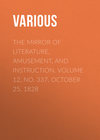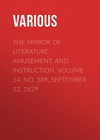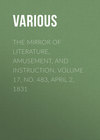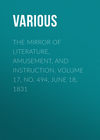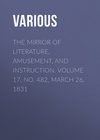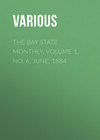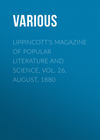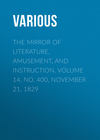Czytaj książkę: «The Mirror of Literature, Amusement, and Instruction. Volume 12, No. 337, October 25, 1828», strona 4
NOTES OF A READER
THE UNIVERSAL PRAYER AND OTHER POEMS
We usually leave criticism to the grey-beards, or such as have passed the viginti annorum lucubrationes of reviewing. It kindles so many little heart-burnings and jealousies, that we rejoice it is not part of our duty. To be sure, we sometimes take up a book in real earnest, read it through, and have our say upon its merits; but this is only a gratuitous and occasional freak, just to keep up our oracular consequence. In the present case, we do not feel disposed to exercise this privilege, further than in a very few words—merely to say that Mr. Robert Montgomery has published a volume of Poems under the above title—that the poems are of unequal merit, and that like Virgil, his excellence lies in describing scenes of darkness.
The "Universal Prayer" is a devotional outpouring of a truly poetical soul, with as much new imagery as the subject would admit; and if scriptural poems be estimated in the ratio of scriptural sermons, the merit of the former is of the first order.2
From the other poems we have detached the following beautiful specimens:—
CONSUMPTION.
With step as noiseless as the summer air,
Who comes in beautiful decay?—her eyes
Dissolving with a feverish glow of light,
Her nostrils delicately closed, and on
Her cheek a rosy tint, as if the tip
Of Beauty's finger faintly press'd it there,—
Alas! Consumption is her name.
Thou loved and loving one!
From the dark languish of thy liquid eye,
So exquisitely rounded, darts a ray
Of truth, prophetic of thine early doom;
And on thy placid cheek there is a print
Of death,—the beauty of consumption there.
Few note that fatal bloom; for bless'd by all,
Thou movest through thy noiseless sphere, the life,
Of one,—the darling of a thousand hearts.
Yet in the chamber, o'er some graceful task
When delicately bending, oft unseen,
Thy mother marks then with that musing glance
That looks through cunning time, and sees thee stretch'd
A shade of being, shrouded for the tomb.
The Day is come, led gently on by Death;
With pillow'd head all gracefully reclined,
And grape-like curls in languid clusters wreath'd,
Within a cottage room she sits to die;
Where from the window, in a western view,
Majestic ocean rolls.—A summer eve
Shines o'er the earth, and all the glowing air
Stirs faintly, like a pulse; against the shore
The waves unrol them with luxurious joy,
While o'er the midway deep she looks, where like
A sea god glares the everlasting Sun
O'er troops of billows marching in his beam!—
From earth to heaven, from heaven to earth, her eyes
Are lifted, bright with wonder and with awe,
Till through each vein reanimation rolls!
'Tis past; and now her filmy glance is fix'd
Upon the heavens, as though her spirit gazed
On that immortal world, to which 'tis bound:
The sun hath sunk.—her soul hath fled without
A pang, and left her lovely in her death,
And beautiful as an embodied dream.
MORTALITY.
All that we love and feel on Nature's face,
Bear dim relations to our common doom.
The clouds that blush, and die a beamy death,
Or weep themselves away in rain,—the streams
That flow along in dying music,—leaves
That fade, and drop into the frosty arms
Of Winter, there to mingle with dead flowers,—
Are all prophetic of our own decay.
BEAUTY
How oft, as unregarded on a throng
Of lovely creatures, in whose liquid eyes
The heart-warm feelings bathe, I've look'd
With all a Poet's passion, and have wish'd
That years might never pluck their graceful smiles—
How often Death, as with a viewless wand,
Has touch'd the scene, and witch'd it to a tomb!
Where Beauty dwindled to a ghastly wreck,
And spirits of the Future seem'd to cry,—
Thus will it be when Time has wreak'd revenge.
MELANCHOLY.
When mantled with the melancholy glow
Of eve, she wander'd oft: and when the wind,
Like a stray infant down autumnal dales
Roam'd wailingly, she loved to mourn and muse:
To commune with the lonely orphan flowers,
And through sweet Nature's ruin trace her own.
VISION OF HEAVEN.
An empyrean infinitely vast
And irridescent, roof'd with rainbows, whose
Transparent gleams like water-shadows shone,
Before me lay: Beneath this dazzling vault—
I felt, but cannot paint the splendour there!
Glory, beyond the wonder of the heart
To dream, around interminably blazed.
A spread of fields more beautiful than skies
Flush'd with the flowery radiance of the west;
Valleys in greenest glory, deck'd with trees
That trembled music to the ambrosial airs
That chanted round them,—vein'd with glossy streams,
That gush'd, like feelings from a raptured soul:
Such was the scenery;—with garden walks,
Delight of angels and the blest, where flowers
Perennial bloom, and leaping fountains breathe,
Like melted gems, a gleaming mist around!
Here fruits for ever ripe, on radiant boughs,
Droop temptingly; here all that eye and heart
Enrapts, in pure perfection is enjoy'd;
And here o'er flowing paths with agate paved,
Immortal Shapes meander and commune.
While with permissive gaze I glanced the scene,
A whelming tide of rich-toned music roll'd,
Waking delicious echoes, as it wound
From Melody's divinest fount! All heaven
Glow'd bright, as, like a viewless river, swell'd
The deepening music!—Silence came again!
And where I gazed, a shrine of cloudy fire
Flamed redly awful; round it Thunder walk'd,
And from it Lightning look'd out most sublime!
Here throned in unimaginable bliss
And glory, sits The One Eternal Power,
Creator, Lord, and Life of All: Again,
Stillness ethereal reign'd, and forth appear'd
Elysian creatures robed in fleecy light,
Together flocking from celestial haunts,
And mansions of purpureal mould; the Host
Of heaven assembled to adore with harp
And hymn, the First and Last, the Living God;
They knelt,—a universal choir, and glow'd
More beauteous while they breathed the chant divine,
And Hallelujah! Hallelujah! peal'd,
And thrill'd the concave with harmonious joy.
VISION OF HELL.
Apart, upon a throne of living fire
The Fiend was seated; in his eye there shone
The look that dared Omnipotence; the light
Of sateless vengeance, and sublime despair.—
He sat amid a burning world, and saw
Tormented myriads, whose blaspheming shrieks
Were mingled with the howl of hidden floods,
And Acherontine groans; of all the host,
The only dauntless he. As o'er the wild
He glanced, the pride of agony endured
Awoke, and writhed through all his giant frame,
That redden'd, and dilated, like a sun!
Till moved by some remember'd bliss, or joy
Of paradisal hours, or to supply
The cravings of infernal wrath,—he bade
The roar of Hell be hush'd,—and silence was!
He called the cursed,—and they flash'd from cave
And wild—from dungeon and from den they came,
And stood an unimaginable mass
Of spirits, agonized with burning pangs:
In silence stood they, while the Demon gazed
On all, and communed with departed Time,
From whence his vengeance such a harvest reap'd.
BEAUTIFUL INFLUENCES.
Who hath not felt the magic of a voice,—
Its spirit haunt him in romantic hours?
Who hath not heard from Melody's own lips
Sounds that become a music to his mind?—
Music is heaven! and in the festive dome,
When throbs the lyre, as if instinct with life,
And some sweet mouth is full of song,—how soon
A rapture flows from eye to eye, from heart
To heart—while floating from the past, the forms
We love are recreated, and the smile
That lights the cheek is mirror'd on the heart!
So beautiful the influence of sound,
There is a sweetness in the homely chime
Of village bells: I love to hear them roll
Upon the breeze; like voices from the dead,
They seem to hail us from a viewless world.
PERSECUTION OF THE JEWS
We know it to be a fact, that a Jew, an artist of reputation, who had conceived a great confidence in a Christian engaged in the promotion of the conversion of the Israelites, revealed to him, that both he and his brother had been Christians from their childhood from having been bred up amongst Christians, but were too indignant at the treatment which they and their brethren met with at Christian hands, to profess Christianity; and he earnestly pleaded, as essential to their being induced to receive the gospel, that those who participate in the attempt should approach them with a language of decided affection for Israel.—Q. Rev.
ABSENTEES
Soon become detached from all habitual employments and duties; the salutary feeling of home is lost; early friendships are dissevered, and life becomes a vague and restless state, freed, it may seem, from many ties, but yet more destitute of the better and purer pleasures of existence.
ITINERANT OPERAS
The first performance of the opera seria at Rome, in 1606, consisted of scenes in recitative and airs, exhibited in a cart during the carnival.
THE GAMUT
Guido D'Arezzo, a monk of the 13th century, in the solitude of his convent, made the grand discovery of counterpoint, or the science of harmony, as distinguished from melody; he also invented the present system of notation, and gave those names to the sounds of the diatonic scale still in use:—ut, re, mi, fa, sol, la, si; these being the first syllables of the first six lines of a hymn to St. John the Baptist, written in monkish Latin; and they seem to have been adopted without any special reason, from the caprice of the musician.—Foreign Rev.
It is said that the first church was erected at Glastonbury; and this tradition may seem to deserve credit, because it was not contradicted in those ages when other churches would have found it profitable to advance a similar pretension. The building is described as a rude structure of wicker-work, like the dwellings of the people in those days, and differing from them only in its dimensions, which were threescore feet in length, and twenty-six in breadth. An abbey was afterwards erected there, one of the finest of those edifices, and one of the most remarkable for the many interesting circumstances connected with it. The destruction of this beautiful and venerable fabric is one of the crimes by which our reformation was sullied.—Southey.
GHOST STORY, BY M.G. LEWIS
A gentleman journeying towards the house of a friend, who lived on the skirts of an extensive forest, in the east of Germany, lost his way. He wandered for some time among the trees, when he saw a light at a distance. On approaching it he was surprised to observe that it proceeded from the interior of a ruined monastery. Before he knocked at the gate he thought it proper to look through the window. He saw a number of cats assembled round a small grave, four of whom were at that moment letting down a coffin with a crown upon it. The gentleman startled at this unusual sight, and, imagining that he had arrived at the retreats of fiends or witches, mounted his horse and rode away with the utmost precipitation. He arrived at his friend's house at a late hour, who sat up waiting for him. On his arrival his friend questioned him as to the cause of the traces of agitation visible in his face. He began to recount his adventures after much hesitation, knowing that it was scarcely possible that his friend should give faith to his relation. No sooner had he mentioned the coffin with the crown upon it, than his friend's cat, who seemed to have been lying asleep before the fire, leaped up, crying out, "Then I am king of the cats;" and then scrambled up the chimney, and was never seen more.
RIDICULOUS MISTAKE
A quantity of Worcestershire china being sent to the Nawaab at Lucknow, in India, from England, he was as impatient to open it as a child would be with a new plaything; and immediately gave orders for invitations to be sent to the whole settlement for a breakfast, à la fourchette, next morning. Tables were accordingly spread for upwards of a hundred persons, including his ministers and officers of state. Nothing could be more splendid than the general appearance of this entertainment; but the dismay may be more easily imagined than described, on discovering that the servants had mistaken certain utensils for milk-bowls, and had actually placed about twenty of them, filled with that beverage, along the centre of the table. The consequence was, the English part of the company declined taking any; upon which the Nawaab innocently remarked, "I thought that the English were fond of milk." Some of them had much difficulty to keep their countenances.
